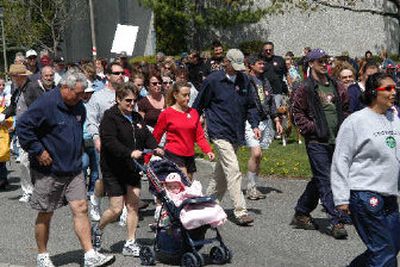Addressing hunger

Having helped coordinate CROP Hunger Walks in Spokane for 12 years, Bonnie Churchwell and others on the planning committee seek some new people to “shadow” them as they organize the 2007 walk.
With just a few members, the CROP Walk Committee plans and presents the annual fund-raising event, which assists with global hunger relief, disaster relief and development programs of Church World Service – or other designated global hunger relief programs – along with several local hunger action and outreach programs.
In the April 2006 walk, walkers from Spokane and Cheney raised $30,794, just slightly less than the record $31,345 collected in 2005 for the 25th annual walk.
Church World Service, the relief, development and refugee assistance ministry of 35 U.S. Protestant, Orthodox and Anglican denominations, provides CROP Walk committees with resources for planning walks and educating people.
For many years, a team of five with the support of hundreds of other volunteers – recruiters, walkers, sponsors and one-day assistants – has made this hunger education and action possible in Spokane.
Churchwell, the local coordinator, moved to Spokane from Colfax in 1971 when her husband, Disciples of Christ pastor the Rev. Jim Churchwell, came to serve the Jefferson Street Christian Church.
Over the years, both of them worked for the Postal Service in Spokane. She retired in 2001 after 24 years of service.
Bonnie Churchwell, who grew up in Kansas, first heard of Church World Service when her farmer father was asked to contribute grain for trainloads sent abroad. She learned more about it in Enid, Okla., where she studied business at Phillips University and met Jim, then a student at Philips Theological Seminary.
A 1992 trip to Ecuador to visit children she sponsored through Compassion International gave her firsthand experience seeing the needs of people in a poor country.
“I began sponsoring children when I started work at the post office,” Churchwell said. “At first, the children were the same ages as our children.
“Now we sponsor six children – in Haiti, Honduras, Ethiopia, Kenya and Indonesia – and a college student in Guatemala, contributing monthly support and letters.”
She follows and supports students through college or vocational training in their own countries, so they stay to improve lives of other people there.
These connections fed the concerns that led to her commitment in recent years to make sure Spokane has a CROP Hunger Walk.
“It’s an opportunity for all Christians and people of faith to gather around their common concern about hunger,” she said, one that gives small churches an opportunity to participate in a large event. Forty-seven churches sent walkers this year.
The committee works with churches to find volunteers who will work for a few weeks on hunger education as part of recruiting walkers and sponsors in their congregations.
“We are growing older and need younger people to help carry on the work of recruiting, contacting churches and doing follow-up from January through spring,” Churchwell said. “We want people to come alongside us, to learn what we do and offer new ideas.”
The tasks are “doable,” she said, with more required from January through April.
Among the committee members, Garold Steed makes arrangements with Gonzaga University about meeting at Martin Centre and obtains necessary permits.
Bev Blott, the committee secretary, writes letters before and after the event. Ann Gregory serves as treasurer.
Dave Noble arranges music the day of the walk and sets up the stage. Elisa Pupo does publicity.
Polly McMahon, who teaches at Spokane Falls Community College, volunteers her class to give eight to 10 hours on the day of the walk. Tina Geither, who teaches exercise science at Gonzaga University, also encourages her students to volunteer.
Several businesses, plus Catholic Charities, the Interfaith Council, Mid-City Concerns, Valley Meals on Wheels, Interfaith Hospitality and the Second Harvest Food Bank, provide support.
Because churches may cut mission activities first when budget crunches arise, Churchwell said, CROP Walks are good ways for people to become involved and learn about the needs – even if it’s just for one day a year.
“We have so much here,” she said. “God blesses Americans and has given more than expected. If we sit down to eat a meal and have clothes, how can we ignore with a clear conscience feeling obligated to share our love?”
The CROP Walk, she said, “is an opportunity, with low overhead, to move some of what we have to places around the globe that suffer. Denominations work together with a common goal to take care of those who do not have the wealth we have.
“If we were in need, we would want help.
“What compels me is the chance to share in Christ’s name, because the gifts continue long term. We can make what we have bigger. I would love to see more people involved.”